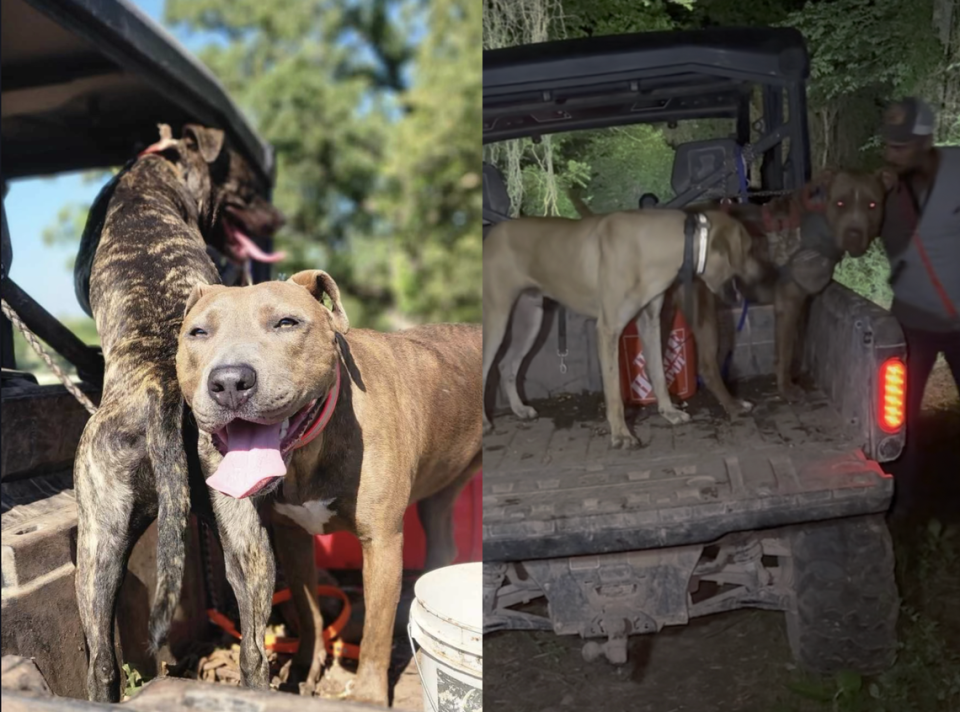Beaufort Co. animal shelter is ‘pittie-full.’ Free adoptions to combat pit bull overflow
The sizes and colors may vary, but there’s an uncanny resemblance among the 40-plus dogs at the county’s overcrowded animal shelter in Okatie. You know it when you see it: the thick, athletic build, high-set ears and a smooth, short coat.
They’re all pit bulls, says Tallulah Trice, director of Beaufort County Animal Services. It’s not an officially recognized breed, but “pit bull” is used as an umbrella term to describe canines descended from bulldogs and terriers.
“Walking down one section of the shelter, and in every kennel you can see your pit bulls or pit mixes,” Trice said. “People say ‘How would you know?’ It’s just a look.”
The county-run shelter is waiving adoption fees and offering free spay and neuter services for all local pit bulls. A county ordinance passed in 2015 mandated the alteration procedures for all pit bulls and pit mixes — but population control takes time, and the pedigree faces stereotypes of aggression that hurt their adoption rates nationwide.
While puppies and in-demand breeds are often adopted within weeks, most pit bulls stay at the county shelter for at least six months, sometimes years. And as the only organization in Beaufort County required to take in all homeless pets, Animal Services bears the brunt of pit bulls that are turned away from private shelters in favor of more adoptable breeds.

Pit bulls were bred to excel in dog fighting rings in nineteenth-century England, a history that contributes to their blemished reputation. Trice attributes the prominence of pit bull attacks to their massive population relative to most breeds, employing the phrase “It’s not the breed, it’s the deed.”
“Anything big has the potential to do harm,” Trice said. “I believe pit bulls are the predominant aggressors in the world because they are the predominant breed in general.”
All dogs at the county shelter are thoroughly screened for aggressive behavior before they’re put up for adoption. In rare circumstances where dogs’ hostility is not improving or a canine resident is in continual poor health, the animal is euthanized.

‘One pit bull out at a time’
Aside from encouraging local adoptions of pit bulls, Animal Services also helps the pups find homes in unlikely places. A score of creative adoption alternatives has helped decrease euthanasia rates at the shelter — especially for pit bulls, who make up 82.5% of their euthanized dogs.
In the year since its inception, the Pit Stop Dogs program has paired about 50 of the shelter’s pit bulls with professional truck drivers looking for a ride-along buddy. Dogs placed into the program are hand-picked to ensure they have the right temperament for the road, according to Trice.
“The trucking industry has grown significantly,” she said. “Woman truckers are out there more. They need companionship and security because they’re on the roads.”
Five particularly high-energy pit bulls from the Okatie shelter recently won the trip of a lifetime: moving to southeast Oklahoma to live and work with hog hunters. The dogs help control the population of the area’s feral hogs, which are considered an invasive species due to their harm to local agriculture and propensity for disease.
“The hunters are looking for high-energy dogs that just have this drive,” Trice said. “(The dogs) live in a home environment. They’re actually becoming hog hunters, and they love it.”

Animal Services is even encouraging local businesses to consider taking in a pit bull. The dogs could serve as an “office pet” during the day while standing guard at night, Trice said. “That’s another thing we’ve been looking into.”
But with nearly 250 pit bulls brought into the shelter so far this year, Animal Services has plenty more lovable local pups that are eligible for adoption. If applicants have a safe and qualified home for the dog, staff can help lessen the financial burden that comes with a new pet.
“We offer crates, leashes, collars,” Trice said. “We’ll do anything to get one pit bull out at a time.”


